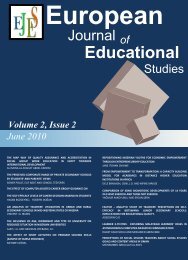Download complate issue - Ozean Publications
Download complate issue - Ozean Publications
Download complate issue - Ozean Publications
- No tags were found...
Create successful ePaper yourself
Turn your PDF publications into a flip-book with our unique Google optimized e-Paper software.
<strong>Ozean</strong> Journal of Social Sciences 2(3), 2009faculty or support staff to strike having nothing to do with the library). When eventually the strike ends, thefaculty librarians or support staff may hold grudges against each other and with management of the librarywhich is usually made up of the academic librarians. This makes it hard to be collegial. Myers (1991) alsowrote that “there is no winning in striking or being struck. There is anger and cessation of friendships. Someresume later, although altered. Some do not resume. Vitae are updated and mailed in random fashion. Weeach have lost something: knowledge, money, respect, etc.”It must be noted that most of the people who work in the libraries are not librarians. An academic library staff isgoing to include librarians (split between administrators and “frontline” librarians), support staff and studentemployees. At the Hezekiah Oluwasanmi Library, Obafemi Awolowo University, Ile-Ife, Nigeria for instance,support staff alone outnumber the professional librarians not to mention the hoards of student employees,National Youth Service Corps members and students from library schools doing their industrial attachmentworks. However, it must be realized that collegiality must include all employees like academic librarians,library officers, library assistants and student employees if collegiality is going to exist in a library. There isalso a lot of overlap between the tasks that all the groups perform in a library, not surprisingly though; the moreprofessionally oriented duties are performed by librarians. However, support staffs also perform someprofessional tasks sometimes especially the library officers who are regarded as para-professional staff withtheir ordinary diploma in librarianship. The student employees perform most of the less desirable work such asbook shelving, but they are also forming the most viable and the first library employees that patrons see. Allthese groups of employees work at public service desk and to many patrons; all employees in a library arelibrarians. All these groups regularly interact with one another in many of the duties they perform daily.Resentment is probably most often felt by support staff towards librarians. Many may not feel they are treatedprofessionally by librarians, though this may be with some justifications. The support staff members may notpossess a master of library Science degree or a faculty rank, but they are investing forty (40) hours a week into ajob which is probably their career. They do many of the same tasks that librarians perform, yet they are paid lessand granted fewer opportunities to make decisions. Even they also feel being looked down upon or mistreatedby librarians, resentment and non-collegial behavior is probably going to follow. Student employees are lesslikely to feel this form of resentment. Their employment is transitory and most of them have no expectation ofmaking a career of working in libraries. They do not expect to be given significant decision makingopportunities and are content to perform the tasks assigned to them. Lorenzen (2006) pointed out that thestudent employees can be very sensitive to how they are treated if they believe that they are not appreciated.Hence their performance may suffer, and this can have a negative impact on the whole library. Ironically, it isoften the support staff employees who resent being taken for granted by librarians, who take their own studentemployees for granted. Without any shadow of doubt, it is crucial for a library staff to work together in aharmonious way. Collegiality must be extended to employees of all types not just the professional librariansalone. Support staffs, both in the academic library and faculties have just as much right to be treated collegiallyand they also should be expected to treat others collegially as well. This does not mean that roles of the threegroups need to be confused or merged. There are differences in jobs and expectations; hence there should beline of demarcation between the librarians and the support staff. However, all the groups can work togetherbetter if there is a common expectation of how to treat one another.Differences in collegiality between lecturers and librarians: Whither the university librarians?As earlier indicated, this paper digresses a little to have a cursory look at the differences that exist between thefaculty lecturers, that is, academic staff and the university librarians. In Nigeria, there are two schools ofthought between the academic staff and the professional librarians in the university setting. One school ofthought believes that university librarians should not be grouped as hundred percent (100%) university academicstaff while the other school believes that by the roles they perform in the university set-up, they are qualified tobe classified as academic staff and not a supporting staff as believed by the first group. In the introductory partof this paper, the academic roles and the importance of university librarians are well spelt out. At this juncture,one pertinent question that comes to mind is that, whither the university librarians? Can one really say thatuniversity librarians are academic staff? And is there any form of collegiality between the university librariansand faculty lecturers? To answer these questions, it is pertinent to realize that there exist areas of convergenceand to some extent areas of divergence in terms of roles specialization and performance. Although both may beranked together based on the same faculty models of titles for example, readers, professors, etc, and pay,collegiality impacts each group differently. This may be due to several factors including the expectations of thepublic and colleagues and in the differences in how their duties are carried out. To put it simply, everyoneexpects librarians to play well with others as Jones (1997) phrased it. According to Cohen, (2007) a collegiallibrarian is helpful, willing to pitch in, and cooperative. Such a person is skilled at collaboration and is a reliablemember of the team. If you're looking for a volunteer, a collegial librarian will step forward. A collegial131
















